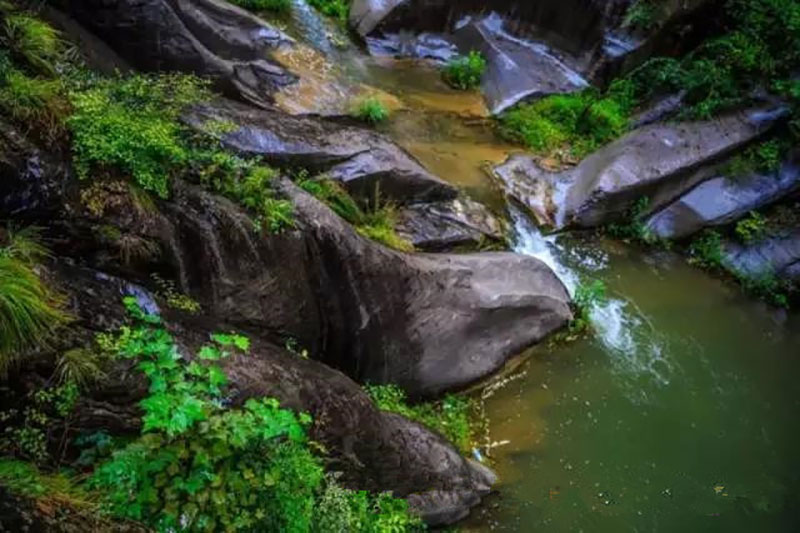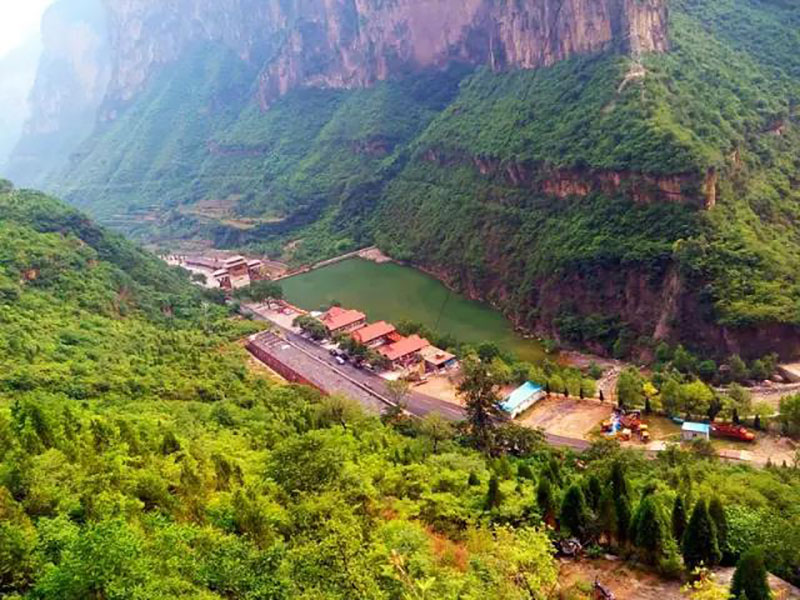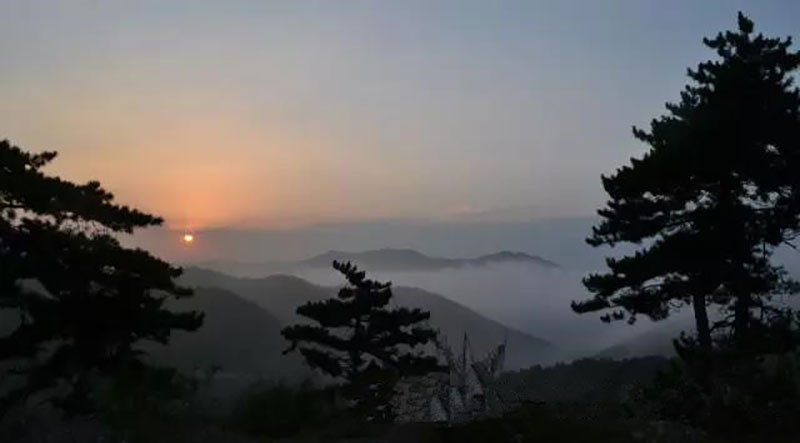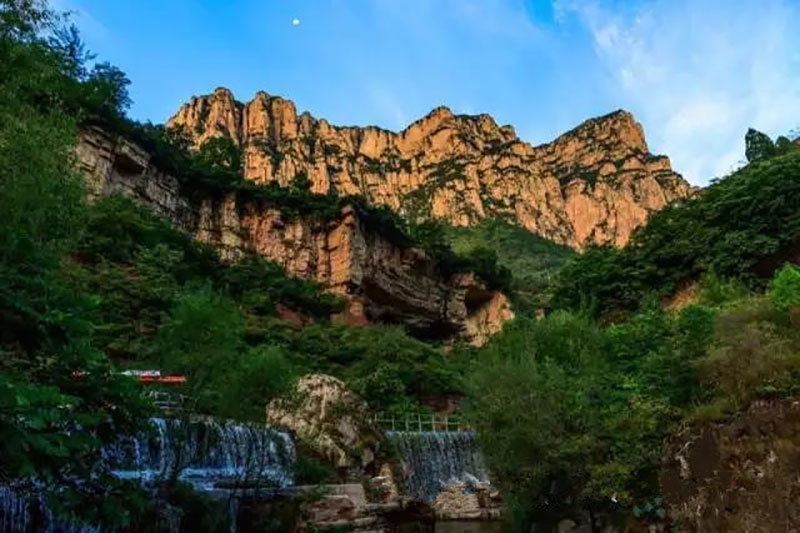



This summer we borrowed the courtroom in the bridge township. An independent three storey building, there is a flower pool in the courtyard, the pool is less, and all kinds of Zucchini are planted. Every room in the building was plastered with the doorbells of the Judge, the People's Jury and the Mediation Office, feeling solemn and daring not speak loudly.
Every stairway is hung with the slogan "forbid those who are good forbidden first, forbid those who are good forbidden before others". When you look up, you will see them first and read them first. Every time you pass by, you feel a sense of righteousness filled with heart and suddenly increase a lot of power. The courts on the bridge are the "presiding judge" of the whole canyon, which are in charge of the legal disputes and lawsuits of the people in the three villages of the bridge, the palm of the tree and the goose house. The common people in the canyon do not like to be angry, and rarely do things happen to Bo Gongtang, thus "idling" the court, making it almost the most "quiet" grass-roots judicial body in China. Every day outside the North window of the office, there are irregular sounds: stuffy pouts on the ground, boards crashing and squeezing each other, baby carriages ringing, baby cries, which are the voices of a small family in Hougou Village. The breath of life is trembling softly here. At home, more than one year old dolls always cry, and later on, they seldom hear their children crying. Looking out of the window, it turned out that the young man who was father had found a way to "cure the crying" - - a young man who carried bricks almost every day on a trolley. Bricks are on the roadside at home. Go out and ride in the empty space. When the brick was removed, the father took the child down and began to carry bricks to the car, then put the child up. Push bricks and children, return home, unload children first, then unload bricks. Again, just a few steps away, the child was surprised and happy, and never cried again.
It's a very simple thing to give others happiness.
Walking away from the courtroom to the depths of the canyon, the road was flanked by rolling hills and gentle slopes with layers of shrubs. The mountain flowers in the West are white. It seems that the white sheep running in groups are going to drink water. At the edge of the mountain stands a huge stone, and the Buddha standing between them is 10, with the top of the knot, and the east side. When the rain stopped, the clouds stretched out their long sleeves around the stone waist, and the misty Buddha seemed to speak in the sky.
East is the village of Hou Gou. The village is small, and dozens of farmers are rooted in the valley. Some houses were in front of the river, some houses were on the slopes, the doorway was loaded with pear trees, hawthorns, the villagers'houses were full of straight like wings like mountains.
Follow the road and walk to a tall mountain gate. The words on the gate must be looked up to see clearly. Crossing a curved bridge, a pool of water under your feet rippled slightly, calling it "dark green", "green" or other words to describe water green seemed inaccurate. I thought for a long time, feeling that this water should be rare on earth, it is related to the sky, that pure, that simple, noble can not be said.
There is an open space inside the mountain gate. A row of two-storey houses red doors and windows, from the outside to see the cave, into the inside but not, each room can take a bath, laundry, cable TV, is the layout of the apartment.
Two big pine trees in front of the house are somewhat "old". People talk under Panasonic, just like in the pavilion, hands up to touch pine needles, one by one with a bright oil color, perfume in the air.
Many windy nights, the sounds of the day here completely disappeared, a kind of mountain-toppling voice will appear in people's ears, thought it was the sound of heavy rain, but carefully listen to the rain falling, floating windows, and then listen to the sound of the wind shaking the trees. I think it's the sound of pine trees. How can other trees have such explosive power? One night, the sound reappeared, looking through the window, only to find that the pine trees remained motionless in the middle of the night, and sentinels generally stood there, silently guarding the valley of the night.
What is the sound? After dawn, I met Qin Zhongliang downstairs. Zhongliang pointed to a tall tree not far away, saying that the voice was "made". It is a poplar tree. The trunk is tall and straight, and each leaf is oval and looks like a human palm. Tens of thousands of palms flipped and appreciated in the wind, and sang the river and sea.
Happy poplars can not be relieved in the daytime, but only at night when they are alone. No, maybe the trees and mountains and other plants in the warm exchanges, silent for a long time in the mountains, a mouth is wisdom, poplar response first, so that the whole body of strength in praise, in cheering. It was a grand gathering of nature.
In fact, people know mountains very well. Qin Zhongliang, who spoke to me, has lived in the canyon for nearly forty years since he was born. Every mountain and every spring here will be searched by his closed eyes.
There are more than 300 kinds of herbs growing in the gorge, such as Bupleurum, Asarum, Polygonum multiflorum and Scutellaria baicalensis.
People also understand the character and temperament of the mountain. Qin Zhongliang treated the mountains as his father did. He looked up to the mountains, pulled up the weeds when he saw them, and cleaned them when he saw the dirt. He could not see the sloppy valley.
The Grand Canyon is good for the Grand Canyon. I will not leave the Grand Canyon for life. Qin Zhongliang's affection for the canyon is clear and sincere.
In the Eastern Jin Dynasty, a fisherman in Wuling County was sailing along a stream. He found a mountain at the end of the peach grove. After entering the cave, it suddenly opened up and became bright, and he found the peach blossom. The place in the Peach Garden. Today, we cross a deep tunnel from the mountainside, take a boat into a peach-shaped water, people in the cool world, physical and mental fatigue, all kinds of troubles will be instantly digested by the ripple green. The iron-walled mountains on both sides of Henggu opened a door for the boat to carry people straight ahead. Suddenly a section of the water narrowed, the boat slowed down and looked up. The straight cliff was dark, and large patches of ink seemed to be spilled from the mountain.
What kind of intentions does nature have to create?
This is the beauty of the canyon, which inspires people to take pen and ink ink to write and picture.
The boat stopped ashore and a valley road came into view. On both sides were unknown flowers and trees, each with shiny leaves and trembling branches, and from time to time water gushed out of the hills into the river at the bottom of the hill. The river rose and flowed silently, sobbed and roared against the rocks, crushing itself into pieces of fish scales.
Surprisingly, the river along the way in the sun, constantly appear green, dark blue, Pearl white, violet colors, brilliant changes, such as true as illusion, like a dream. Just as he was watching, a few dark clouds came quietly in the sky, and a raindrop the size of a copper coin fell on the mountain, and he hurried back to the valley, only to find the sun shining high and the ground dry. Language: ten days, different days. The Grand Canyon is a heavy day.
More than 1600 years ago, where is the the Peach Garden written by Mr. five Liu? Maybe it can be found here.
Introduction to Wang Fei
Wang Fei was admitted to Shaanxi Normal University after he retired from the Navy. Member of China Writers Association, member of China Travel legend alliance, deputy general manager of Tai brigade shares. There are "Nanbu mountain", "open the door of the soul" and "Liang Liang". Among them, "Xin Bu Nan Shan" was designated as "Nature Writing Green Reading" by the Environmental Protection Association; and "Let Dreams Are Not Far Away" was listed in the "National Extracurricular Reading Hundred Library". His works were compiled into Junior High School Chinese Reading Training, selected into the "Chinese Prose List", "100 My Favorite Proses", "The Best Years of Chinese Prose", "The Most Classic Travel Prose" and other selected editions, and reprinted by "Selected Prose", "Prose. Overseas Edition" and "Youth Digest". He has won the first Gold Prize for Tourism Literature in China, the first Xu Xiake Literature Award for Travel Literature in China, the third and fifth Bingxin Prose Award, and the third Liuqing Literature Award.




